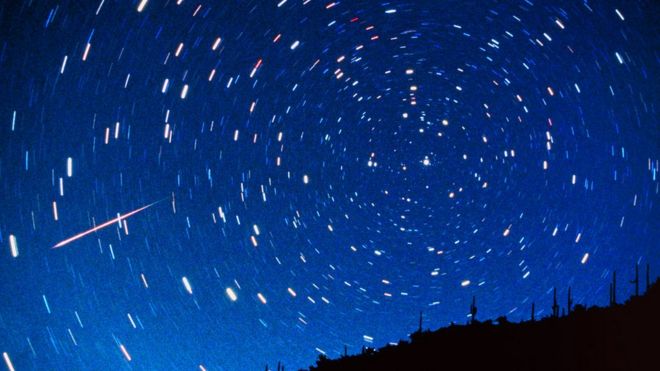Jupiter gravity nudge sets up 'meteor storm' on Earth

Observers are looking forward to an annual event that's expected to turn into a "meteor storm" on Friday morning.
The Perseid shower occurs every August but this year scientists say a gravitational nudge by Jupiter will make it more intense.
Some researchers are predicting up to 200 meteors per hour in the night sky at the shower's peak.
The Perseid meteor shower is caused by a trail of debris from a comet called Swift-Tuttle which orbits the Sun.
Every year between July and August, the Earth drifts into the comet's trail and is peppered with meteors which burn up as they hit the atmosphere, disappearing in streaks of light.
These meteors are called the Perseids, because they appear to be coming from the constellation, Perseus.
But this year will be unusual according to Dr Robert Massey of the Royal Astronomical Society.
"The Earth will move through a particularly distinct bit of debris a day early and this clump of material has been nudged by Jupiter's gravity.
"A rich stream of material is going to move into the path of the Earth as a result, and so Thursday night into Friday we should see a real enhancement of meteors.
"You might perhaps get to see hundreds a day and that will be something to look forward to."
Normally people viewing from a dark area, away from lights can see between 60 to 100 meteors an hour at the shower's peak.
The US space agency Nasa believes that could double this year.
"Forecasters are predicting a Perseid outburst this year with double normal rates on the night of August 11-12," said Bill Cooke with Nasa's meteoroid environments office.
"Under perfect conditions, rates could soar to 200 meteors per hour."
In towns and cities in the UK, expectation might be a bit more modest. Observers can normally expect to see between 15 and 25 meteors each hour but on this occasion it is likely to be even more spectacular, according to Tom Kerss who is an astronomer at the Royal Observatory Greenwich.
"This year we could expect to see at least a 30 to 50% increase across the peak in the next couple of nights which means that those numbers will rise to over 30 to perhaps 40 meteors each hour for people living in urban environments and for people living in the countryside, where the sky is really dark, that could easily exceed 120 perhaps even 150 meteors an hour."
Some scientists are cautiously predicting an even a sharper bust of activity which could result in hundreds of meteors each hour just before sunrise.
"That would be something akin to what we would call a meteor storm," said Mr Kerss.
"We are a little uncertain as to whether that is going to be accurate - even the scientists who made the predictions are cautioning us that the data is not conclusive - but it certainly makes it worth going out and looking for it - because we could be in for a real treat."
| 




